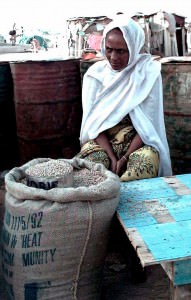UN Declares Famine in Southern Somalia
The famine has resulted in more than 160,000 Somalis seeking refuge in neighboring countries like Ethiopia, Kenya, and Djibouti. Most of them arrive in terrible physical condition – malnourished and exhausted.
Civil conflict
Following the overthrow of Mohamed Siad Barre’s regime in 1991, Somalia has been struggling with ineffective governments and civil war. In place today is a weak and corrupt transitional government. Although backed by the United States and its allies, the Somali government is barely capable of addressing the famine.
Today, much of the government’s efforts are focused on preventing Al-Shabaab, an insurgent group linked to al-Qaeda, from overtaking the Somali capital of Mogadishu.
[pullquote]
Failed harvests, combined with violent conflict in many areas, gradually gave rise to food insecurity.
[/pullquote]
The famine was not something to be unexpected in the Horn of Africa. For several months, the United Nations had warned of an impending crisis. Failed harvests, combined with violent conflict in many areas, gradually gave rise to food insecurity.
The United Nations
For the first time in almost two decades, the United Nations employed the term famine to describe the situation in Somalia – a word it so sparingly uses.
In order for a famine to be declared, specific measures of malnutrition, hunger, and mortality must be met. Amongst other criteria, a famine can only be declared when more than 30 percent of the population is malnourished, and when a state witnesses large-scale displacement.
[pullquote]
…The WFP is looking to open several new land and air routes in order to securely access the millions of Somalis in need.
[/pullquote]
Declaring a situation as a famine does not legally obligate the UN or its member states to carry out any specific actions – but it does provide the region with global attention.
The United Nations World Food Programme (WFP) said it will begin providing Somalia with vital supplies in the next few days. In addition to airlifting emergency aid, the WFP is looking to open several new land and air routes in order to securely access the millions of Somalis in need.
In 2009, Al-Shabaab had banned foreign aid agencies to access central and southern areas of Somalia, but has recently declared that it would allow aid into famine-stricken parts of the country.
B. Lynn Pascoe, UN Under-Secretary-General for Political Affairs, joined by Augustine Mahiga, Secretary-General’s Special Representative for Somalia, visited Somalia’s capital yesterday.
The visit, which consisted of several meetings with Somali leaders, included talks on the end of the transitional period. The visit also signaled the UN’s solidarity with the Somali population amid times of suffering.
Mr. Pascoe claimed that the Somali leadership had made it clear that the famine would be made a top priority.
ARB Team
Arbitrage Magazine
Business News with BITE.
Liked this post? Why not buy the ARB team a beer? Just click an ad or donate below (thank you!)
Liked this article? Hated it? Comment below and share your opinions with other ARB readers!
























Share the post "UN Declares Famine in Southern Somalia"